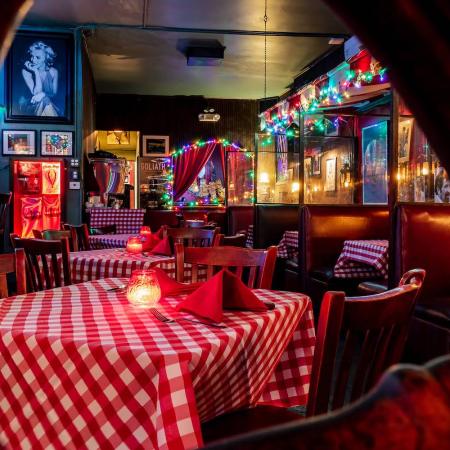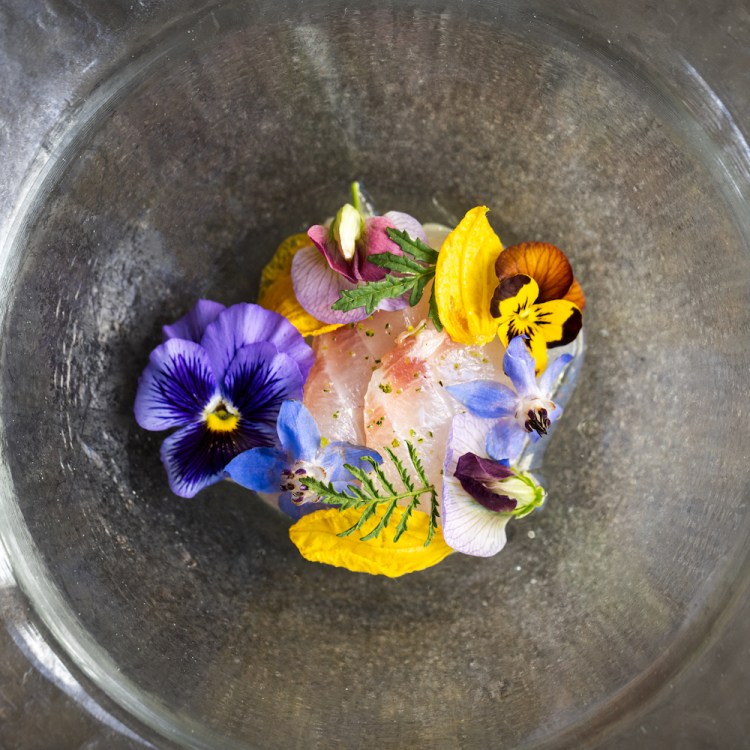“LA is not perfect, but it’s a lot less racist than other places where I’ve worked,” says Selena the Stripper, a stripper and sugar baby who’s been doing sex work for about five years — long enough to know the lay of the land here. (Selena notes that Atlanta strip clubs are less racist than LA’s.)
As far as the Los Angeles scene, Selena explains, “There’s a lot of money here. There are many rich and powerful people who pop by strip clubs. It’s been pretty great money overall, but on the flip, clubs exploit us.”
Selena is nonbinary, uses fae/faer pronouns and goes by @prettyboygirl on Instagram, where fae writes long, lyrical captions that shed light on what it’s like behind-the-scenes as a femme-passing sex worker. Selena’s not shy about critiquing the industry or the entertainers fae sees as dilettantes who try to swoop in for money or clout as faux sex workers, like FKA twigs or Bella Thorne.
Selena’s also an activist, and there’s no shortage of questionable business practices at local strip clubs. “Most take about half of the cost of every dance we sell,” fae says. “They expect us to tip out management and all of the other workers who get paid hourly already. And they treat us as disposable.”
This has inspired Selena to organize for a locally founded labor rights group that initially protested in favor of the California labor law AB-5, a controversial law that enforced a new test for determining if a worker was an employee or independent contractor, radically changing classifications in many industries, including strip clubs. The group first went by Soldiers of Pole but has since changed its name to Strippers United and now helps dancers across the U.S. understand their rights. Selena currently serves as the group’s president.
However, not all Los Angeles strippers are as united as the name might imply. In Selena’s assessment: “We have a decent sex work community, but it is fractured, and many people are disinterested with the idea of solidarity.”
Employee Classification Challenges
I first met Onyx Black when she was stripping at a North Hollywood fundraiser for Strippers United. She was a crowd favorite with an extremely athletic routine — acrobatic spins around the pole, limbs in every direction, down into a power splits — but she now leads a different contingent. “I run an organization called Artists for the Revolution, and we are working to either have a choice in AB-5 or to eradicate it altogether,” she explains.
AB-5 went into effect throughout California on January 1, 2020, right before the pandemic hit, and it’s been a contentious issue among dancers. In some ways, it protects strippers by classifying them as employees and thus ensuring their access to workers comp and other wage protections and programs. But to keep their costs down, strip clubs have been more restrictive about how many dancers they have on payroll. For some strippers, it has had devastating consequences, exacerbating the industry’s already rampant discrimination.
That meant a lot of strippers like Onyx, who is Black, and those from other marginalized groups, like transgender, large-bodied and disabled dancers, had already been cut from their old clubs’ rosters. “A lot of us were already not really dancing in the strip clubs because they wanted to pick the best of the best in their eyes, which is never the most marginalized,” Onyx says.
However, the protections of AB-5 aren’t irrelevant. AM Davies started dancing in 2002, and in 2006 won Spearmint Rhino’s Entertainer of the Year. Then in December 2018, she was hit by a car while driving her motor scooter through the streets of Los Angeles. “Half of my left foot was crushed and amputated on impact. That was all five toes and the ball of my foot,” she says.
This forced Davis to live on half a foot for a year and a half and then, after enduring several surgeries, she made the difficult decision to get a full amputation. But despite the medical and financial hardships, “I do not qualify for disability because I had been improperly classified as a worker for my entire dancing career,” she says. If Davis had been classified as an employee instead of an independent contractor, she would have contributed to Social Security Disability Insurance over the years and be eligible to draw from it after her accident. The changes under AB-5 would have helped protect her.
“So when you’re an independent contractor, which is how we’ve been classified by the club owners for decades now, you have to individually sign up for disability insurance in order to have those benefits if you end up needing it,” Davis explains. “And the same goes for unemployment: You have to actively engage in those programs as an individual in order to have access to those benefits later, if needed.”
But one has to have the information and foresight to prepare in advance of a harrowing situation, and those facts are little known within the community. As Davis points out, “I just assumed because I paid my taxes that I would have access to at least disability.” However, the only government program she could access was Medicare or California’s version, Medi-Cal. Other than that, she says, “I received zero help from the state or the government or anything from my 18-year career.”
Davies points out that employee classification has other implications as well. For strippers not classified as employees, it can be tough to access unemployment aid, and “even getting a stimulus check was going to be difficult because a lot of strippers don’t file their taxes.”
COVID-19 Side Effects
With the aftermath of AB-5, the pandemic hit doubly hard. After losing her spot at her former club, Onyx Black went on to work at a “really shitty dive bar” and then started her own virtual show during the COVID lockdowns. Her income during that time came from virtual shows, camming and escort work — and Onyx isn’t the only dancer who had to pivot her services during the pandemic.
Every stripper I spoke with for this article had done virtual shows at some point during the pandemic. And beyond that, most had supplemented with additional offerings like OnlyFans, camming, sugaring and/or working as an escort.
“For a year, I didn’t work at the club. I got into escorting to make ends meet,” Selena explains. “I was scared of contracting COVID. There is no way to perform intimate services and avoid the kind of close contact that spreads the virus.”
Selena didn’t go back to the club until it was possible to get fully vaccinated. “Since then, it’s been gradually getting better,” fae says. But it’s not quite the same: “A lot of regular customers stopped coming because many regulars were in at-risk groups.”
Thus, virtual shows became the new industry bedrock during the pandemic. When infamous Hollywood strip club Jumbo’s Clown Room closed due to the lockdown in March 2020, Jumbo’s strippers Reagan, Coco Ono, Gabrielle and Stripperina founded a popular recurring virtual show called Cyber Clown Girls that is still operating, even though the club has since reopened.
“Lots of strippers turned to digital shows to avoid risking their health to work in person,” Selena says. “Those collaborations both forced strippers to use their collectivized powers and also created rifts in the community because it highlighted some of the underlying inequalities that have existed in the industry since its conception.”
Race was one of the issues that came to the forefront during the pandemic, especially after George Floyd’s tragic murder on May 25, 2020. This exacerbated divisions within the community and resulted in some organizational restructuring, which has led to greater diversity in leadership and voice. Many of these shows operated as mutual aid with tips split evenly among dancers, and they also raised a lot of money for causes like Black Lives Matter, as well as other organizations fighting against injustice and for communities affected by the pandemic.
“I didn’t make any money during the pandemic unless it was from the virtual club. That’s where my food, gas, and I’m-going-to-get-through-this-pandemic money kind of came through because the government was not helping us,” says Nats Honey. “But somehow we all banded together — even though we were at one point trying to rip each other’s throats out, we still banded together somehow.”
But some dancers had a rude awakening when they were ready to get back to in-person work at the club. AM Davies explains that a Californian is no longer considered an employee after three months, and they have to reapply — and might not get rehired at their home club.
That’s what happened to Reagan and Coco Ono when Jumbo’s Clown Room reopened in June 2021. They felt like the reason they didn’t get hired back was retaliation for their outspoken social justice and labor rights advocacy. This experience prompted Reagan to start a Change.org petition to “Stop Strip Clubs From Firing Strippers Without Just Cause!”
Watching the clubs they relied on to make their livelihood shutting down was traumatic for a lot of dancers, Reagan included, but “the flip side of it was, I think it made us all a lot more innovative, creative and brave,” she says. Running virtual shows was empowering — Reagan got better acquainted with her leadership skills — and some strippers realized they’re going to be just fine (maybe better), even if there’s no home club to go back to.

Less stigma, but more saturation
“Before the pandemic, I felt like I didn’t know a lot of other people doing OnlyFans,” Meredith Jacqueline says. “Or if they were, they weren’t as public or vocal about it. There was still a bit of a stigma.”
Perhaps it was boredom, necessity or sudden influx of stimulus money that changed things. “I’ll be honest, from March 2020 through like March or April 2021 I made more money than I ever have in my life. That was prime time for OnlyFans,” Jacqueline notes. “Now when I tell someone I do OnlyFans they know like five other people who do it, too, it’s become totally normalized — which is great when it comes to the social aspect and not feeling like a pariah, but terrible when it comes to market saturation.”
AM Davies agrees that the way sex work and sex workers have been trending within the mainstream over the past couple of years has been a double-edged sword. Yes, it’s helped to destigmatize the work, but “the more cool we seem, the more our aesthetic is co-opted, the less that does for us, actually. Co-opting our aesthetic and not paying the creators of that aesthetic…. It really just continues to push us into the fray, and it makes it harder for us to get the attention that we deserve.”
With the flood of newbie online sex workers showing up to get their slice of the bread, lots of these folks aren’t career sex workers. One such OnlyFans creator is Adrienne Airhart, who is also a comedian and the manager of a cannabis collective. “I never would have thought about doing it until the pandemic happened,” Airhart says. She was able to pay off medical debt from two surgeries, go on a lavish European vacation for five weeks and get married in the Florida Keys before she recently canceled her OnlyFans account. Her only regret is not going harder at the beginning, “before Bella Thorne ruined it for everybody.”
The one-time Disney Channel actress joined the platform in August 2020, claiming it was research for an upcoming role. Thorne quickly became the first OnlyFans creator to make $1 million within 24 hours of joining the platform. However, after a misleading post led to a stew of chargebacks, she was blamed for the OnlyFans restrictions that followed, negatively impacting other OF creators’ ability to set prices and receive payouts.
Meredith Jacqueline mentions that it can be hard to stand out against “these people who are shiny and new.” These days, she has to work harder to make less than a year ago. That means she’s doing a lot more content with a partner than she initially planned on, and “as someone who does not do studio porn, that’s been kind of a challenge.”
And that’s not the only challenge she’s facing. There’s also the constant struggle to avoid being banned from payment platforms and social media apps. Jacqueline says she’s been banned from CashApp once and Venmo and Instagram twice on each. Those bans come at a heavy price for an influencer and online sex worker like her, since she runs her whole business online. The first IG account Jacquline lost had 150K followers, and the second one had 80K followers.
“It was devastating,” she says. “And now, even though I have an account with over 30k followers, I’m terrified to promote at all because I don’t want that account to be deleted too… I don’t even do anything illegal!”
The extra hustle eats into quality of life. “I’ve noticed a lot of burnout within my online SW community lately,” Jacqueline says. “I think we’re all exhausted, especially as social media — Instagram in particular — has made it harder and harder for us to promote our businesses.”
A cooperative future
The OnlyFans gold rush has subsided, and now clubs are back open, vaccines are widely available, and mask mandates are being rolled back across California. “I feel optimistic. Things have more or less returned to normal,” Selena the Stripper says. “People really missed in-person contact, and I think people are grateful to have access to intimate labor again. It’s not entirely safe, especially because lots of people have expressed vaccine hesitancy, but it’s a risk I’m willing to take.”
With an emboldened taste for entrepreneurship and some strippers not returning to their home clubs, pop-up strip clubs have left their mark, and the buzzword on everyone’s tongue is “co-op.”
“Creating this kind of hybrid strip club co-op is one of the main things that I’m working on right now,” Reagan says. “It’s a great way to just take control back because this industry is just so classically designed to really keep strippers at a certain level.” Since people are more willing to attend in-person events, they’re trying a hybrid model — a live show with a virtual option.
Of course, Reagan has dreams of these pop-ups morphing into real, brick-and-mortar clubs. However, she doesn’t need your pie-in-the-sky suggestion, thank you very much. “I can’t tell you how many people, when everything went down with me, and they were just like, ‘You should open your own club, and we’ll come and support it!’” she says. “I’m like, ‘Well, that’s great, but I really need like a million dollars to put down.’”
Reagan is planted firmly in reality, but that doesn’t mean she’s daunted by the work ahead. She’s currently collaborating with Nats Honey on Artists Plex, a co-working space and production complex for exotic dancers and their allies to further their careers. As far as Nats was concerned, things were moving ahead smoothly: “I negotiated a lease. The building that we want is over 14,000 square feet. The landlord is with us. It is all lined up like a magical cream pie.”
Then the ever-present risk of deplatforming reared its ugly head. They were in the middle of their fundraising campaign on GoFundMe, and as they were releasing invested member bios — one which mentioned the tools and resources a member provides to the sex community — they got an email saying they’d violated terms of service because of prohibited content, despite the fact that Nats had read the terms of service before signing up and thought they were safe.
“It’s extremely frustrating because we’re constantly being pushed into the non-existent realm,” Nats says. “I’ve already registered the LLC. I have the building on lock. Everything is in place, legitimate. There’s no difference between our business and the next business. Everything is on the line. And now you’re telling me that because one of my members provides resources to a community that’s prohibited content, and we can’t raise funds on your platform?”
The project is still moving forward. It’s not as convenient, but now they’re taking donations for Artists Plex via Zelle. Nats Honey is frustrated but remains hopeful: “I definitely think co-ops is the thing of the future. I just don’t know how fast that’s going to go.”
In the meantime, Artists Plex isn’t the only collaboration among local strippers. In March, Strippers United led a strike against Star Garden strip club in North Hollywood for unsafe workplace conditions and the firing of two dancers. It seems to have engendered a sense of cooperation within the community. (Though the organizers’ Instagram account for the effort has already been disabled and reinstated.)
Reagan agrees. “I totally feel that this recent strike has been a unifying force for the local stripper/sex work community. Perhaps it is because the strike focuses on something very basic and relatable to all — safety in the workplace. It’s not mired down in anything ‘divisive’ yet,” she says. “But goddamn it, I’m going to enjoy the unity for as long as it lasts!”
Whether you’re looking to get into shape, or just get out of a funk, The Charge has got you covered. Sign up for our new wellness newsletter today.
























